Jill Carnegie is the founder of Valley of the Kings Sanctuary (VOTK) in Sharon, Wisconsin. The sanctuary is the second oldest big cat rescue in the nation and has been taking in animals that have been abused by humans for more than fifty years.
Most of the big cats that come to VOTK have been mistreated to the point of starvation and deformation by people that have profited off their pain and suffering for entertainment purposes.
Jill has made it her life’s mission to compassionately care for the lions, tigers, bears, and more that are lucky enough to find their way to VOTK after a lifetime of anguish.
The Exotic Animal Trade
Exotic animal trading is a $15 billion plus industry a year. It is astonishingly legal to buy, trade, and breed captive animals in many parts of the United States.
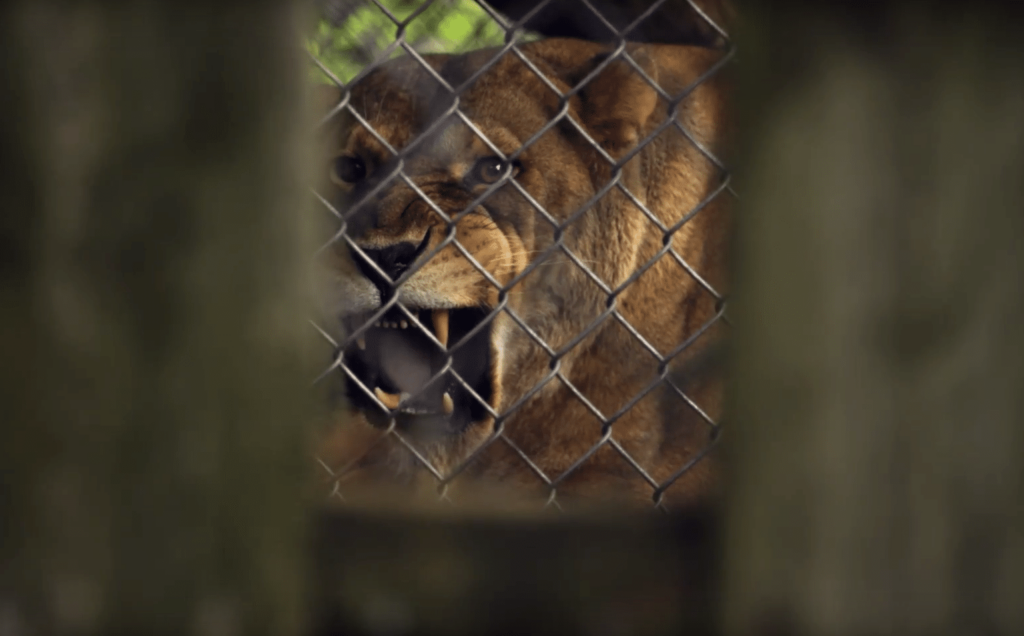
Once in an owner’s possession, exotic animals typically lead miserably short lives under cruel conditions. Many are kept in far to small enclosures, were they’re improperly nourished and never let outside.
People are able to exploit the animals as property rather than sentient beings, to do as they wish with them, which includes using their “pets” as revenue generators in for-profit businesses.
Big Cat Exploitation
Big cats specifically are used at a young age for cub petting attractions that delight humans but cause enormous stress to the animal.
“It’s a sad situation, and people should never pay to hold a baby cat,” Jill said about the practice.
“It’s absolutely disturbing,” she continued. “Babies are taken away from mamas, bottle fed, then handed around and exhausted and distraught.”
“People dismiss it, that animal is going to suffer for its entire life if it doesn’t find a safe haven.”
To complicate matters, cub petting has an extremely limited time frame before the lovable baby cub grows up into a dangerous juvenile cat.
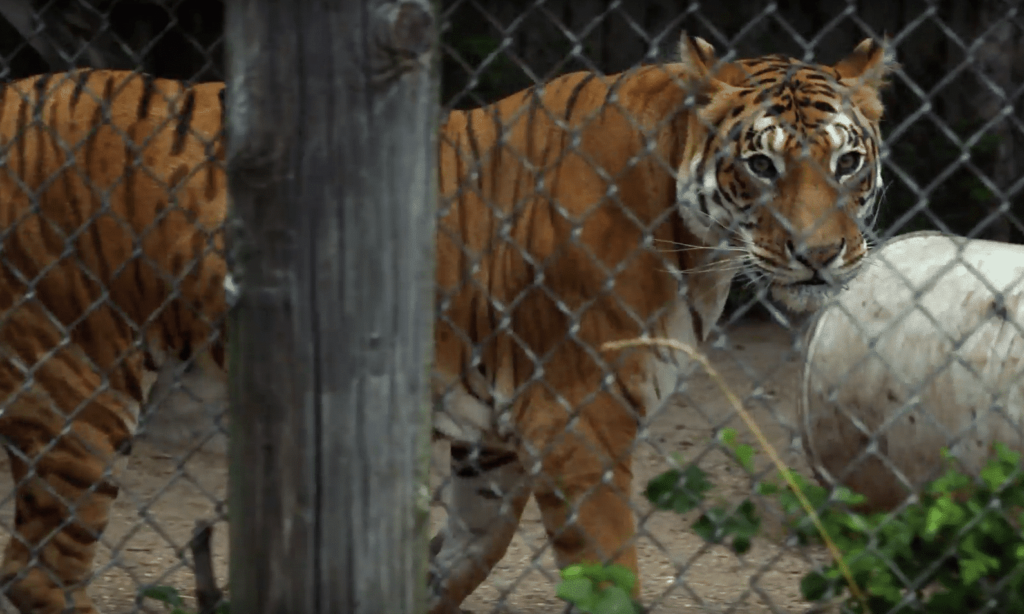
“Nobody ever asks what happens when they’re done with them,” Jill pointed out.
The answer is nothing short of disturbing. When cubs grow up, they require an enormous area to roam and hundreds of pounds of meat to be properly fed.
Young big cats go from being adorable money makers to dangerous expenses for owners. As a result, they are rarely kept past the cub age.
Unlike other unwanted domestic animals, exotic owners can’t exactly drop them off at an animal shelter or dump a stray lion on the side of the road like many do to domestic dogs and cats, so they resort to much more lethal methods of disposal.
An enormous part of the exotic animal industry involves parting out animals for profit. Their hides can be sold as pelts, their meat for consumption, and even their bones are used as virility enhancers in eastern medicine.
Big cats, specifically lions, are sold off to game preserves for canned hunts, where they’re hunted as prey by the very people who were cuddling them months earlier.
“In Texas, big game hunts, you can take a lion and kill it,” Jill said about game reserves.
“Turn it loose or leave it in the cage, then be brave and go hunt an animal that was once a bottle baby.”
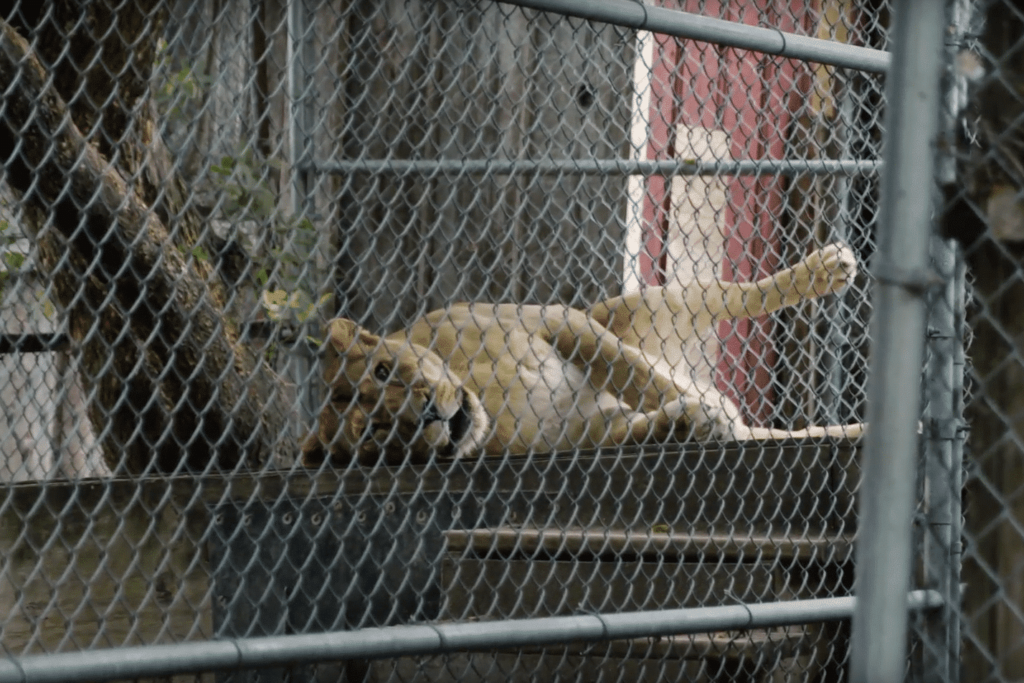
“The animal won’t even make it out of the cage,” she stated. “Or they’re shot multiple times and suffer horribly.”
Canned hunting is a big business, which sees “hunters” pay up to $45,000 to kill a lion, who according to PETA, are often sedated or tied to a stake to make them easier to shoot.
Because the hunters typically plan to display the head of the animal as a trophy, they aim for the abdomen, which leads to a slow agonizing death for the big cat.
While canned hunting has been banned in 20 states, it is still a thriving practice in many others. However, due to 2023’s landmark animal welfare law, the Big Cat Act, lions and tigers will soon be a scarce commodity.
About The Big Cat Act
The Big Cat Public Safety Act (Public Law No: 117-243) was signed into law by President Biden on December 20, 2022.
The law prohibits the private possession of lions, tigers, leopards, cheetahs, jaguars, cougars, and hybrid species.
While current big cat owners are grandfathered in, they must register their animals to make sure that first responders and animal control are aware of the big cats in their possession.
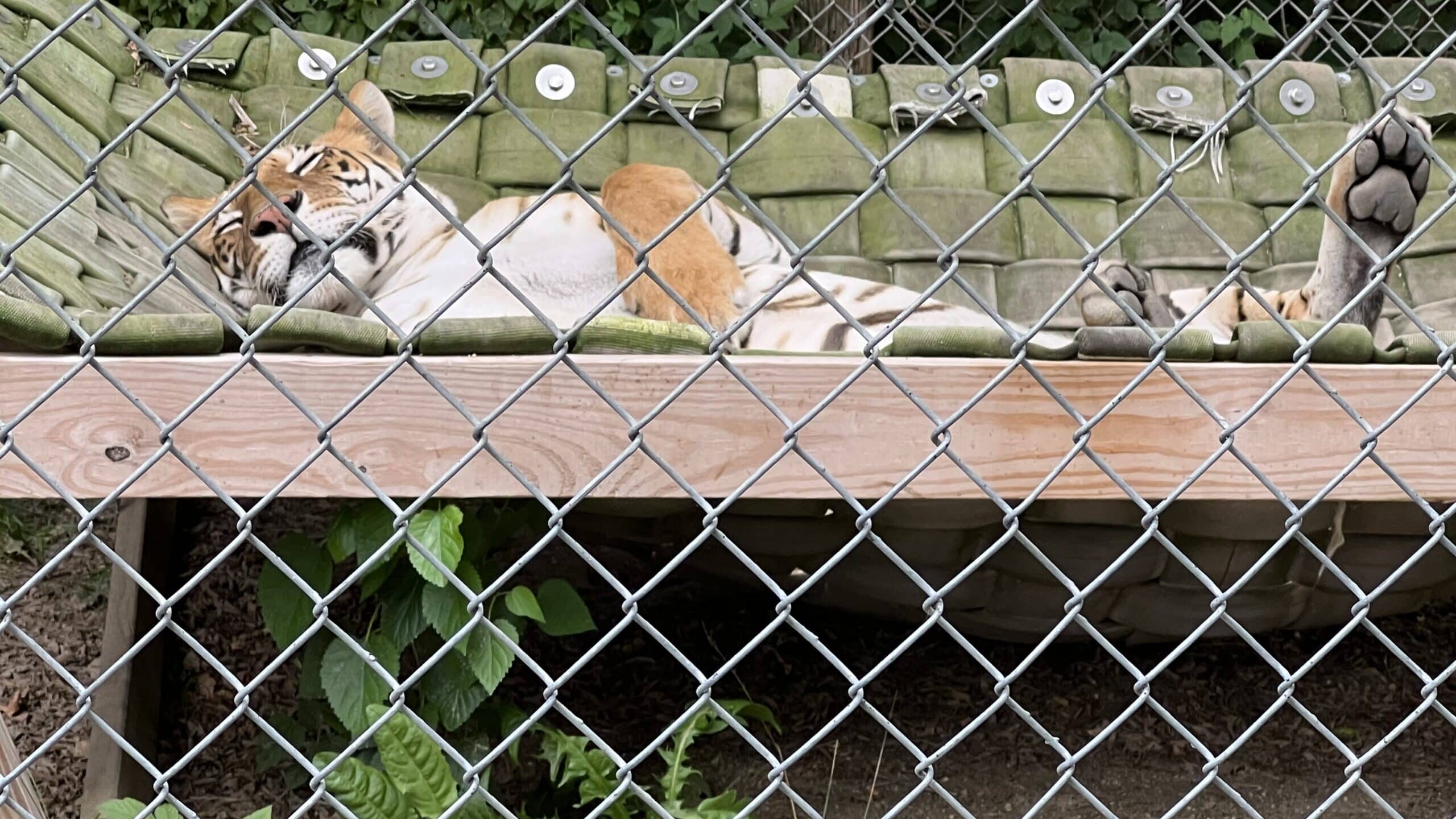
However, under the law, they will not be able to breed their existing big cats, or sell them off for parts, which will likely dramatically curb rampant backyard breeding in the United States as a whole.
The law also restricts direct contact between the public and big cats, effectually ending the cruel practice of cub petting, in an effort to stop the vicious cycle of funneling young cats, who aged out of the business after a mere 12 weeks, into the exotic pet trade.
The only exemptions to the law are universities, zoos, and sanctuaries like Valley of the Kings.
While the law’s not perfect, as it still does not ban canned hunts, Jill believes that it’s a step in the right direction.
About Valley of the Kings Sanctuary
Jill has been operating VOTK for decades, after purchasing the land for the explicit purpose of giving a home to unwanted and abused tigers. Over the years she expanded to accept all big cats, and pretty much any unwanted animal that she came across.
VOTK is now home to a host of tigers, bears, wolves, foxes, bob cats, peacocks, emus, horses, cattle, hundreds of feral cats, a serval, a giant tortoise, and one female lion.
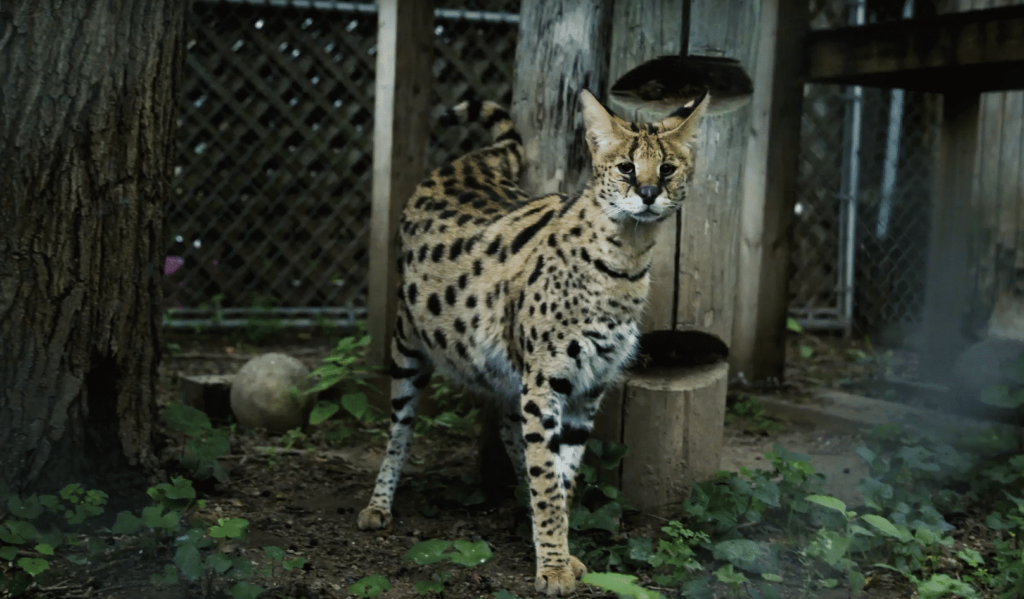
Throughout the sanctuary’s existence, Jill has rescued big cats who were so mistreated at circuses that they had permanent burn marks from jumping through fire hoops, others who were used in Hollywood and had their jaws wired shut so they wouldn’t bite, and big cats who were scheduled to be euthanized due to their age.
Jill explained that plenty of zoos are the primary offenders of casting off animals for their age. She pointed out that big cat cubs are a prime attraction at zoos, but after they hit four months, no longer have value and are often euthanized to make room for next year’s cubs.
The other way she rescues animals is when a government agency seizes a big cat from a criminal, who frequently keep the animals as ferocious pets to intimidate their enemies.
Any big cat Jill has rescued from a criminal situation has come in with serious malnourishment issues and deformities from a lifetime of being kept in too small enclosures.
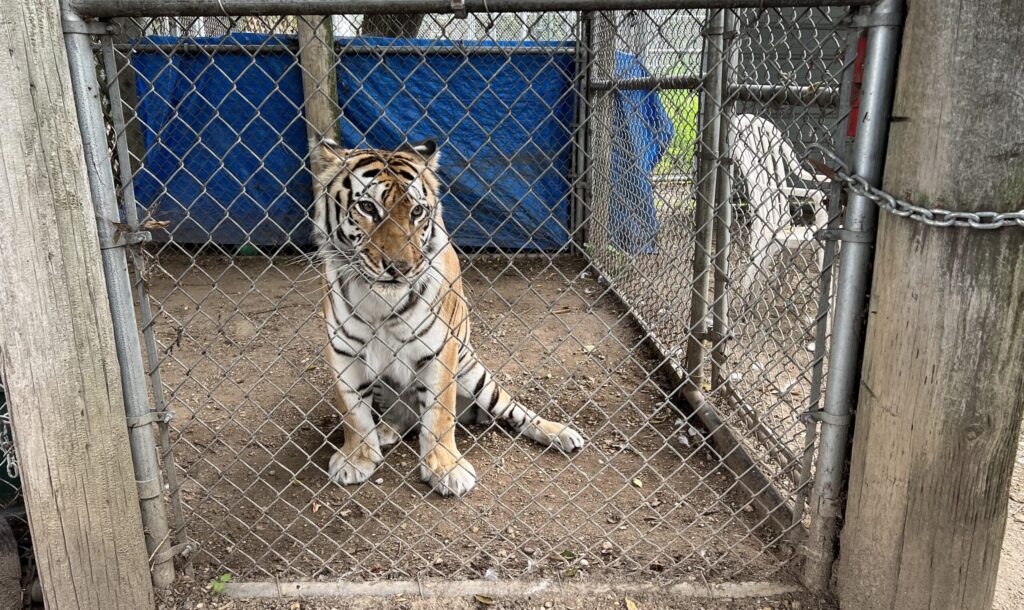
Despite the government’s reliance on her sanctuary, they’ve never received a dime of government assistance.
“We do not get any state of federal funding ever. If an institution sends us an animal, then it’s just your problem,” she explained. “Here you go, take care of it and that’s all they need to know. Financially no, they don’t help us out.”
Instead VOTK relies on private donations from supporters and local businesses to feed their animals around 600 lbs. of meat a day, provide their medications, and pay for the staff member’s salaries.
They’re also heavily reliant on the dedicated group of volunteers that keep the sanctuary running by feeding and cleaning up after the animals, along with maintaining their enclosures and building structures to house the constant influx of new rescues.
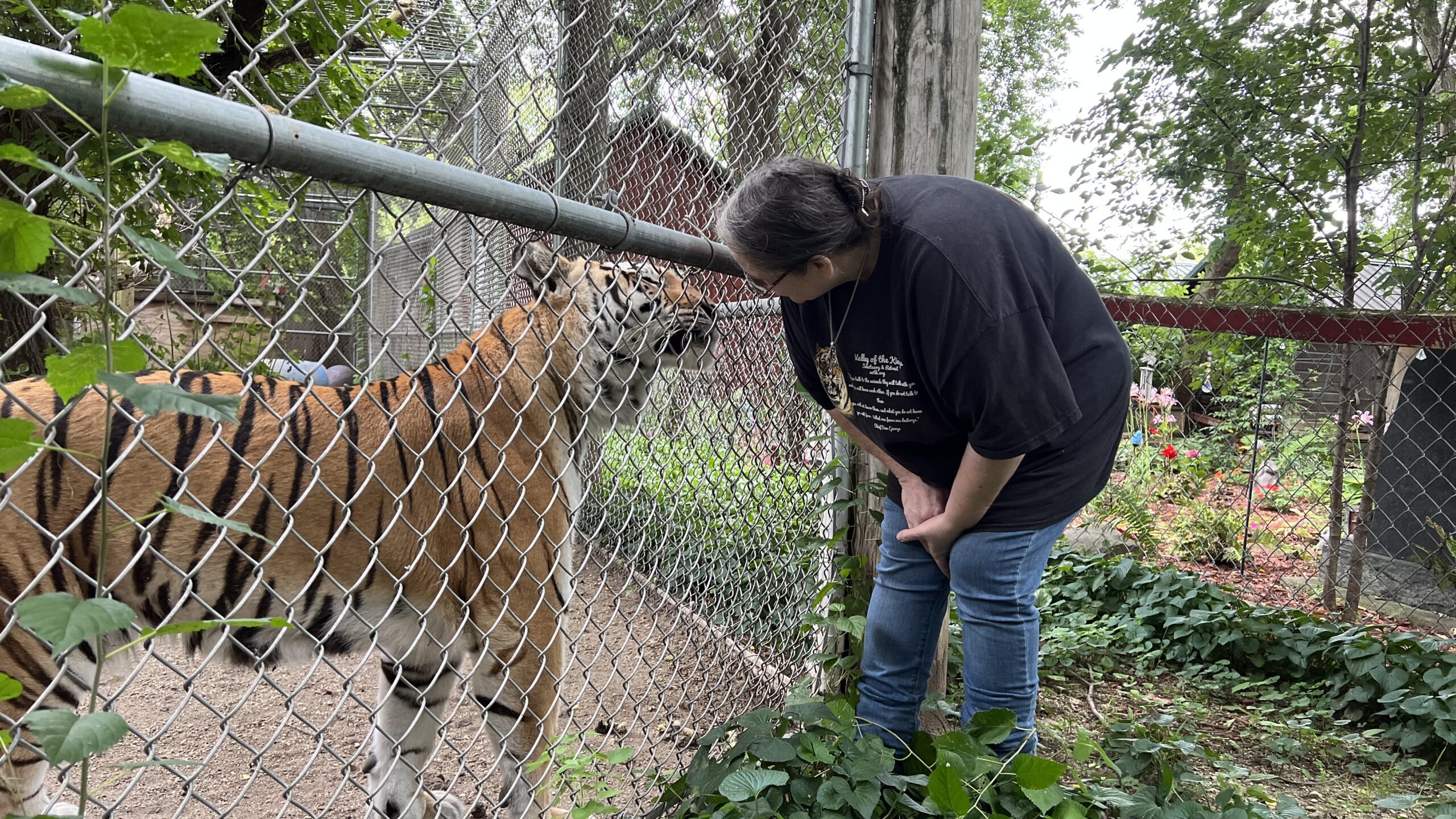
Why Jill Carnegie Is A Hero
Jill has dedicated her life to taking care of animals that have been abused and abandoned by others. She rescues them despite their pressing medical issues and deformities, and allows them to live out the rest of their lives in peace, providing them with good food, friends, and toys.
Jill actually connects more with the animals in her care then she does with other people. She notes that despite most of the animals she rescues being apex predators, they’re very happy creatures that “live for love.”
She believes that after a lifetime of abuse, once they come to her sanctuary, that she can tell they’re grateful for their new lives. “They’re not mean vicious killer animals, humans are,” Jill remarked.
Did you miss Niccalina Santilli’s Featured Showcase?
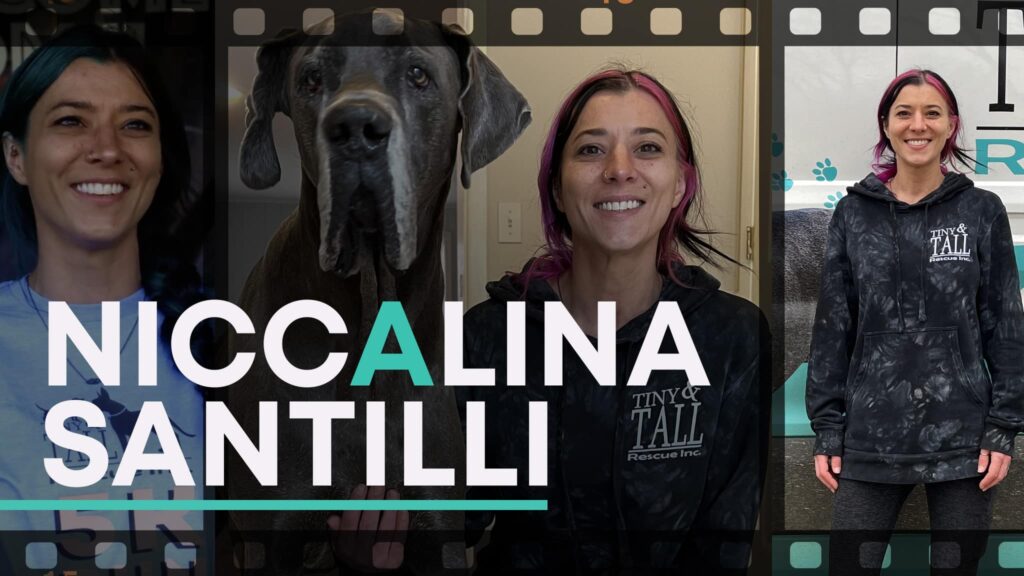
Despite operating VOTK for decades, Jill has not ever taken a dime from the sanctuary, and often goes out of pocket to cover the short fall of donations.
“I get by, I live very primitively, I don’t take paychecks,” she explained. “I’ve never taken a paycheck in all the years I’ve been doing this. Everything that comes in goes directly to the animals 110%.”
Jill lives on the property alongside the animals and her husband. She has ensured her legacy will last long after she has passed by willing the sanctuary and all of her land to its animal inhabitants.
Valley of the Kings Sanctuary Resources
VOTK is in a constant struggle to feed, house, and attend to the medical needs of the animals in their care.
You can support their mission by visiting the resources below.
DONATE to VOTK through PayPal.
Become a MEMBER to visit the sanctuary.
Show support by buying something off their SUPPLIES WISH LIST.
Make a direct purchase for the sanctuary from AMAZON, TARGET, or CHEWY.
Buy some VOTK MERCH.
Meet the ANIMALS of Valley of the Kings Sanctuary.
Check out the VOTK WEBSITE.
Visit Valley of the Kings Sanctuary’s FACEBOOK page for updates and videos.